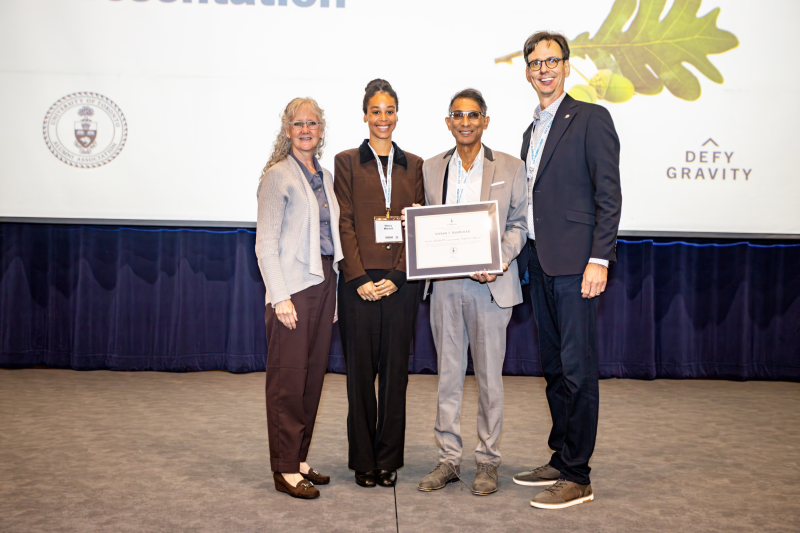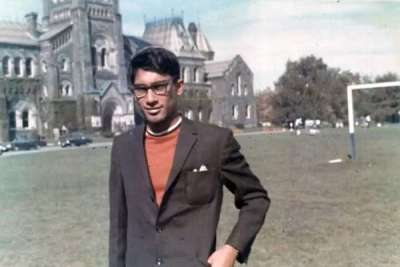June 2, 2025 | Alumni | Volunteer & Awards
Vivian Rambihar, renowned cardiologist and champion of culturally sensitive health care, receives Carl Mitchell Award

Vivian Rambihar accepting the 2025 Carl Mitchell Community Impact Award. Left to right: Carl Mitchell's wife Margaret Shaw and daughter Nancy Mitchell, Dr. Rambihar and UTAA President Corwin Cambray.
When Vivian Rambihar (BSc 1972 UC) was working as a cardiologist in the ER at Scarborough General Hospital in the early 1990s, he noticed a higher-than-average proportion of patients of South Asian heritage coming in with premature heart attacks.
This felt like an important observation, one that hadn’t been discussed in Canada before. So he did the research, documented what was happening, and brought together an interdisciplinary team at the hospital to explore the challenge of disparity and diversity in health.
“We had pharmacists, social workers, doctors, nurses, even patients coming together to discuss these things,” he says. “We collaborated, we researched, and we raised awareness of multicultural health and the need for culturally sensitive care.”
The project lasted throughout the 1990s – “It was a magical decade working with an extraordinary team,” Dr. Rambihar reminisces – and led to published papers and editorials, speaking engagements around the world and community advocacy and outreach, both at home and abroad.
“Since this was a social-cultural issue, we went out into the community and met the people where they were,” says Dr. Rambihar, whose community advocacy and outreach work continues to this day.
Today, culturally sensitive health care is a widely recognized concept. But back then, there was little to no discussion on ethnic and gender differences in health. In fact, Dr. Rambihar was often dissuaded from discussing the subject, as it was considered too controversial.
“But we felt it was too important,” he says. “Higher rates of sudden death and heart disease in different communities? We thought, somebody has to do something about it.”
He adds, “Reducing disparities in health globally has the power to improve the lives of millions of people and save millions of lives.”
Bridging medicine, equity and community impact
To recognize his lifetime of contributions to health care and society, the University of Toronto Alumni Association (UTAA) has named Dr. Rambihar the recipient of the 2025 Carl Mitchell Community Impact Award. Named for past UTAA president Carl Mitchell, who passed away in 2016, the award recognizes alumni who advance the principles of equity, diversity and inclusion through their extraordinary contributions to the community at large.
“Dr. Rambihar’s career has bridged medicine, equity and community impact,” says UTAA President Corwin Cambray (MScPl 1999). “His deep commitment to culturally sensitive health care and grassroots community work honour the legacy of Carl Mitchell, making him an exceptionally deserving recipient of this award.”

An immigrant himself, Dr. Rambihar was born and raised in Guyana and came to Canada in 1970 to study math and physics at U of T’s University College. After completing his undergraduate degree in 1972, he went to McMaster University to earn his medical degree.
Throughout his education in Canada, he was often one of the only non-white students in the class – and while he says this didn’t really bother him, his background did help make him more attuned to the significance of cultural differences once he became a doctor.
“I had the background to think about this and to spot differences,” Dr. Rambihar says.
As one example, he noticed dieticians would give standard diet advice based on the typical foods eaten by a white, North American population – but none of it considered the foods immigrant populations were actually eating at home. And the tables used to predict health and disease risks were based on data from white populations, he adds, making them unreliable for others.
Chaos and complexity in health care
Dr. Rambihar's ideas about culturally sensitive health care have also been shaped by his other research passion: chaos and complexity science. This is essentially the study of how small changes can lead to big, unpredictable effects in complex systems.
He’s considered a pioneer in integrating chaos and complexity science into medicine – an interest that began when he read the influential 1987 book Chaos: Making a New Science by James Gleick, right around the time he had seen several otherwise healthy patients coming into the ER with unexpected heart attacks at a young age.
“It got me thinking: why does the unexpected happen unexpectedly? And to me, chaos and complexity science explained it better than traditional science,” he says. “In chaos and complexity science, small things can have big, often surprising effects – so we took that to mean small changes can cause big and often unpredictable effects in health care as well.”
For instance, in the case of South Asian populations immigrating to a new country, adapting cultural practices to a new setting could lead to unpredictable health issues – and the remedy for those might not be what you would expect either.
“Health care and medicine are complex, dynamic,” says Dr. Rambihar. “When you try to change things in a community, it doesn't necessarily happen predictably. Any little thing can give you opposite, unintended effects, so you need constant feedback and adaptation.”
A testament to U of T’s values
Since the 1990s, Dr. Rambihar has given talks around the world about culturally sensitive health care and chaos and complexity science – and he’s published a number of books on these topics, including 2005’s Tsunami Chaos and Global Heart: Using Complexity Science to Rethink and Make a Better World.
He’s an adjunct assistant professor at U of T’s Temerty Faculty of Medicine and has won countless awards, including the Canadian Cardiovascular Society Segall Award for Health Promotion in Canada, the Indo Canadian Chamber of Commerce Humanitarian Award and the Queen’s Diamond Jubilee Medal. In 2012, he was named one of the Top 25 Immigrants in Canada by Canadian Immigrant magazine, and in 2024, he was inducted into the Scarborough Walk of Fame. On June 19, he’ll proudly deliver the speech at University College’s convocation.
And he remains deeply involved in the community, frequently attending Guyanese, West Indian, South Asian and other cultural events and festivals to strengthen community ties and spread the word about preventative health practices.
Barbara Dick, assistant vice-president, alumni relations, says Dr. Rambihar exemplifies the profound and far-reaching impact University of Toronto alumni have on the world. “His pioneering work in culturally sensitive health care and unwavering commitment to equity and community well-being are a testament to the values we champion as a university,” she says.
“We take immense pride in celebrating alumni like Dr. Rambihar, whose accomplishments not only transform lives but also elevate U of T’s global reputation for excellence, leadership and addressing the world’s most pressing problems. We are delighted to join the UTAA in celebrating him as the eminently deserving recipient of the 2025 Carl Mitchell Community Impact Award.”
About Carl Mitchell
Carl Mitchell (BSc 1984 SMC) gave several lifetimes’ worth of contributions to U of T before passing away from cancer at the age of 55.
His many roles include president and treasurer of the U of T Alumni Association (UTAA) and sitting on the Group of 175 – Campaign Leadership, the Governing Council Committee for Honorary Degrees and the Department of Computer Science Industrial Advisory Board.
He began the UTAA’s Community Engagement Initiative to celebrate the service of U of T volunteers. He was himself honoured with an Arbor Award, U of T’s highest distinction for volunteers.
Building on his success in business and as a pioneer in the computer industry, Carl also became a significant donor to U of T by generously funding a computer lab in the Bahen Centre for Information Technology.

